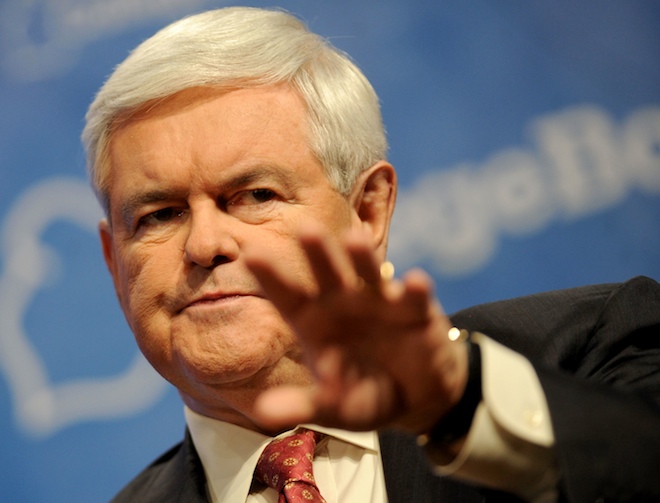The Newt-mentous march to the top of the Republican field has led to many head scratching conclusions. Don’t Tea Party Republicans, who have been searching for a candidate to call their own, want a Washington outsider to carry the mantle? How has a candidate whose organization literally got its first phone line in their Iowa office this week become the leader there by a huge margin? What happened to Mr. Inevitable, Mitt Romney?
The last few days have seen a deluge of polling on the Hawkeye state. The topline results all say one thing: Gingrich is ahead, by a lot. His margins have increased as the previous frontrunner, businessman Herman Cain bowed out, suspending his campaign. The data shows Gingrich pushing above thirty percent while former Mass Gov. Mitt Romney is relegated to fighting with Rep. Ron Paul (R-TX) for second place, a battle that pits a motivated group of Paul supporters against the lukewarm love of Romney folks.
But the real news in the latest round of Iowa polling is not that Gingrich is doing well — Texas Gov. Rick Perry and Cain have done as much already. It’s that Gingrich is sapping support thanks to the exit of Cain — and taking it from many of the other candidates as well, in a possible coalescing of support behind his candidacy.
“We may have come to the end of the flavor of the month candidates,” said Dr. Lee M. Miringoff, Director of The Marist College Institute for Public Opinion, who just released a major poll on the state for NBC news. “What we’re struck by is that Romney is the second choice of the Gingrich people and Gingrich the second of the Romney people.” Mirigoff said that the main takeaway from the latest polling was twofold: yes, Gingrich is up. But Romney is also falling, something that wasn’t as stark during other GOP candidate surges.
The most surprising well of support for Gingrich, a longtime Washington pol with decades of experience, is the Tea Party. He increased his support among strong Tea Party voters literally thirteen times over in the NBC/Marist poll of Iowa, going from a measly three percent in October to 39 percent now. With those who simply support the conservative movement, he went from four percent to 27. He even went from six percent to 21 among those GOPers who don’t support the Tea Party, showing just show broad his support has become over the last few weeks.
Much of that improvement seems thanks to Cain’s collapse and ultimate departure. But Bachmann’s Tea Party support has also dissipated, as has Perry’s. Romney himself also gave some ground. The only other candidate who has gained with Tea Partiers since the Cain collapse has been Paul. That trend also showed in a recent Public Policy Polling (D) survey, which found Gingrich soaking up the strongly conservative support while Romney remained with his combination of somewhat conservative voters and moderates. But as we’ve known all along, it looks like nabbing the middle of the Republican Party isn’t enough to come out on top.
The key turn is what Republicans think Gingrich offers as a candidate. He’s more serious, because he combines the main reason for choosing Romney with the fact that he’s not Mitt Romney.
“The Gingrich surge is such a threat [to Romney] because unlike the values focused, Gingrich goes to the rationale for the Romney campaign, which is electability,” said Mirigoff. “The nature of the Gingrich campaign cuts to the core of Romney’s appeal. That becomes more problematic.”
The data shows that Newt is now thought by Iowa Republican caucus-goers to be the best candidate to beat President Obama. That agreement is clear across an NBC/Marist poll, an ABC/Washington Post survey out Monday and a CBS/New York Times poll out Tuesday. It seems that if Romney was banking on electability as the key driver to his “Inevitable Candidate” status, he’ll need to counter the thinking (among Republican voters) that he’s not the only choice they think can win in 2012.









